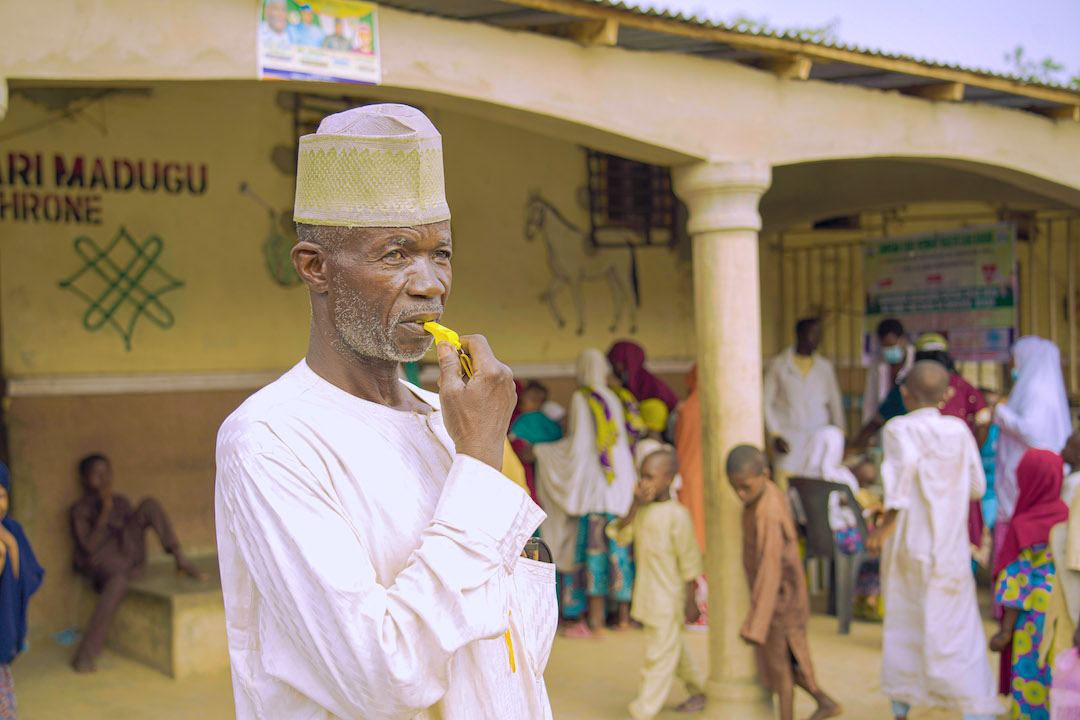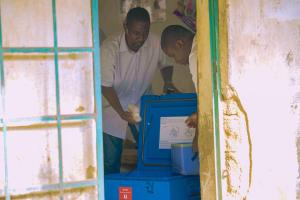Protecting every child from poliovirus
Abuja ‒ In the remote Nigerian village of Bororo-Kambari, five-year-old Fati Isah and her two siblings are lining up with other children their age and younger, preparing to be vaccinated against polio. “My mother says immunization is important and we should receive the vaccine,” she says proudly.
In their village, located in Katcha Local Government Area (LGA) in Niger state in north-central Nigeria, local children were among a total 2 509 687 who benefited from an 18-day mass vaccination campaign, which ended in mid-August 2023. Niger state is of particular concern as 14 of its 25 LGAs are plagued by insecurity, which negatively impacts provision of immunization and other health services.
“My mother says immunization is important and we should receive the vaccine.” Five-year-old Fati Isah.
Transmission of the circulating vaccine-derived poliovirus type 2 (cVDPV2) still occurs in some African countries. Nigeria reported 1028 cases in 2021 and 170 cases in 2022. To date this year, 51 cases have been notified in six states. Niger State notified four cases in 2022, but no cases so far this year.
Nigeria’s National Primary Health Care Development Agency, with support from World Health Organization (WHO) through Global Polio Eradication Initiative partners, agreed to conduct routine immunization intensification with both the fractional inactivated poliovirus vaccine (a smaller dose of the vaccine) and novel oral polio vaccine type 2 (nOPV2), targeting 13 high-risk and security-compromised states. This marked the first time that the fractional inactivated poliovirus vaccine has been administered in Nigeria. The vaccine boosts the immunity of both previously vaccinated and zero-dose children.
“WHO is a fundamental partner supporting the state to implement the campaign…” Dr Ibrahim Ahmed Dangana, Executive Director, Primary Health Care Development Agency, Niger State
According to preliminary data from nine states, a total 4 779 260 children have received the fractional inactivated poliovirus vaccine and more than 27 million the nOPV2 vaccine, while over 111 000 zero-dose children have been reached. In addition, more than 930 000 children in insecure settlements were among those vaccinated.
“Nigeria has made commendable progress, with a 70% reduction in the number of cVDPV2 notifications in 2023 compared with a similar period in 2022. This progress is mainly due to the country’s use of innovative strategies to reach high-risk populations in inaccessible settlements and other vulnerable groups,” says WHO Representative in Nigeria, Dr Walter Kazadi Mulombo.

The recent vaccination campaign in Niger state was crucial to interrupt cVDPV2 transmission and reach zero-dose children, says Dr Ibrahim Ahmed Dangana, executive director of the state’s Primary Health Care Development Agency. “WHO is a fundamental partner supporting the state to implement the campaign, including planning for extensive vaccination coverage in security-compromised areas,” he says.
Prior to the campaign, WHO also supported Niger state with comprehensive training of over 3000 health workers and relevant stakeholders on all aspects of vaccination, including injection safety protocols, and provided technical guidelines to primary health facilities.
Communications Officer
WHO Nigeria
Email: hammanyerok [at] who.int (hammanyerok[at]who[dot]int)
Media Relations Officer
WHO Regional Office for Africa
Email: dalalm [at] who.int (dalalm[at]who[dot]int)
Tel: +254 703 245 761 (WhatsApp)
